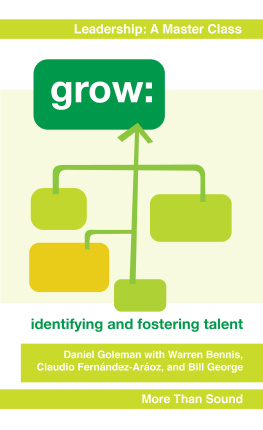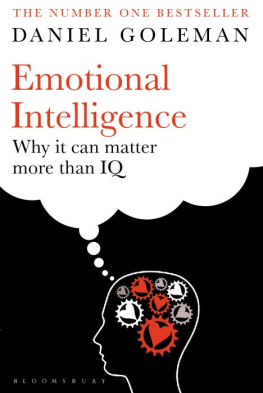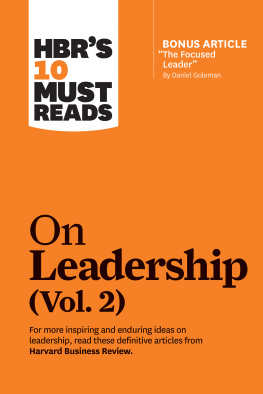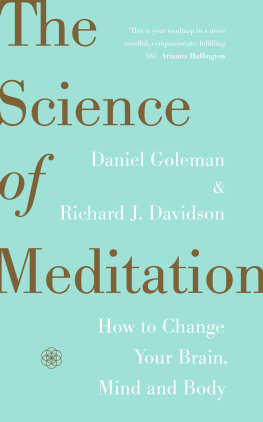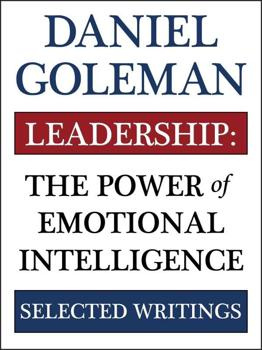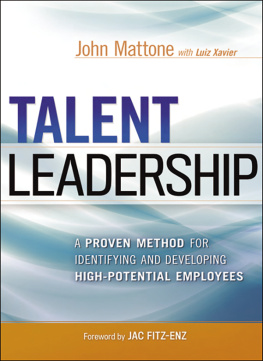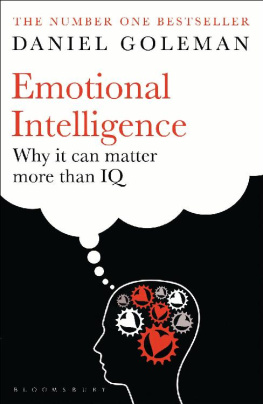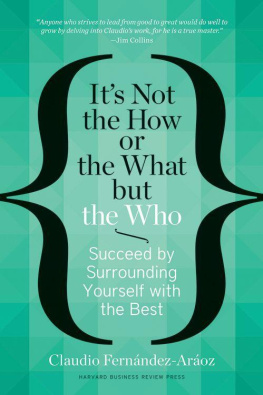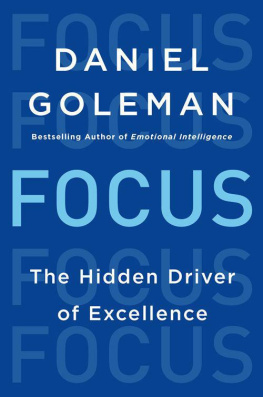Daniel Goleman - Grow: Identifying and Fostering Talent
Here you can read online Daniel Goleman - Grow: Identifying and Fostering Talent full text of the book (entire story) in english for free. Download pdf and epub, get meaning, cover and reviews about this ebook. year: 2015, publisher: More Than Sound, genre: Business. Description of the work, (preface) as well as reviews are available. Best literature library LitArk.com created for fans of good reading and offers a wide selection of genres:
Romance novel
Science fiction
Adventure
Detective
Science
History
Home and family
Prose
Art
Politics
Computer
Non-fiction
Religion
Business
Children
Humor
Choose a favorite category and find really read worthwhile books. Enjoy immersion in the world of imagination, feel the emotions of the characters or learn something new for yourself, make an fascinating discovery.
- Book:Grow: Identifying and Fostering Talent
- Author:
- Publisher:More Than Sound
- Genre:
- Year:2015
- Rating:4 / 5
- Favourites:Add to favourites
- Your mark:
- 80
- 1
- 2
- 3
- 4
- 5
Grow: Identifying and Fostering Talent: summary, description and annotation
We offer to read an annotation, description, summary or preface (depends on what the author of the book "Grow: Identifying and Fostering Talent" wrote himself). If you haven't found the necessary information about the book — write in the comments, we will try to find it.
Daniel Goleman discusses authentic leadership, talent strategy, and the components of high-performing teams with Bill George, Claudio Fernndez-Aroz, and Warren Bennis. Grow: Identifying and Fostering Talent is the second in a set of three ebook compilations from our Leadership: A Master Class video series.
Grow: Identifying and Fostering Talent — read online for free the complete book (whole text) full work
Below is the text of the book, divided by pages. System saving the place of the last page read, allows you to conveniently read the book "Grow: Identifying and Fostering Talent" online for free, without having to search again every time where you left off. Put a bookmark, and you can go to the page where you finished reading at any time.
Font size:
Interval:
Bookmark:
Daniel Goleman: I want to try to get an eagle-eye view of your work and thinking on leadership, which is quite vast and deep at the same time. You come from a business background, youre best known for having been the CEO of Medtronic, and bringing it from a billion dollar cap to a sixty billion cap over your tenure, and now at Harvard being a professor of management in the Business School. I think whats most intriguing to me is your work on authentic leadershipwhat you call True North Leadershipand the several books youve written along those lines, starting with your book about being CEO at Medtronic, and then about Authentic Leadership and True North now True North Groups and I think right at the outset Id like to know: What do you mean by that phrase? What is an authentic leader?
George: Someone whos genuine and realwhere you know that youre dealing with the real person. Theyre comfortable in their skin, and you can sense that in dealing with them. Theyre open. Theyre willing to be vulnerable, so its like the genuine article. And you may have characteristics that some people do not consider authentic. You may have a certain ego. You may have a certain motivation, but I dont think thats inauthentic.
I think thats all part of the whole package. Like, Im a very impatient person. Do you consider me inauthentic because Im impatient? No, Ill say Im impatient. I dont like driving in traffic, or waiting in line. Im not proud of the characteristic, but its part of who I am. So there are downsides, and the negative sides.
Or being proud of where we come from, instead of ashamed. Even if I come from abject poverty, or a difficult family situation, thats part of who I am, and so I cant deny that is who I am. So I think thats all integral to being authentic, but I think its most simple to say: just being comfortable in your skinknowing who you are, not what you are. You know, Im a professor at Harvard but that doesnt describe anything about who I am. There are thousands of those people out there.
Goleman: So, you also urge people to develop their unique leadership stylenot to try to copy someone or to read a book about it, or find a template and then try to fit thatbut to be your own leader. Why is that so important?
George: Thats the only way you can be authentichaving your own unique style. How could I emulate someone else? How could I be like Jack Welch? Jack Welch was known as the CEO of the centurynot a decade, but the 20th century. How could you be like Jack Welch? And a lot of people have tried to emulate that style. We used to have what we called the great man theory of leadership, in which you would try to emulate a great president, for instance. Well, then Id be a total phony. And think how the women leaders felt about that. So, I think its key to remember that style is not whats important, any more than the way you look, your physique. None of these things are important. This is all the external stuff. Whats important is whats inside you. Who are you? Not what are you, not how you look, what appearance do you give. That comes later. That should be a natural outgrowth of who you are.
Goleman: What happens if a leader is inauthentic?
George: Well, this is how I got into the field, because I was in business 33 years. Ive always been fascinated with leadership. When I was a little boy, I had summer jobs. I was studying the top leaders of a company. That wasnt my job, but I was fascinated with it. At Medtronic I focused mostly on the contacts I had in the business, and then I saw my whole generation of leaders and those a few years older going down, like Enron, WorldComthis whole fiasco back in 2002. And so what happened? See, it wasnt just the people who went to jail. In every life, theres always people who are going to be deviant, but they were supposedly good people that lost their way, and the reason they did is they got caught up playing the game, somebody elses game, being something different than they were, and they took their companies down with them because when it came to the crunch, they couldnt make the numbers. Had a problem, they did the wrong thing. I thought, what happened to my generation of leaders? How did it lose its humanity, its authenticity ? How did it become a faade? How did they try to become rock stars when they were just normal, average people? So thats why I decided somebody has to speak out on this, and I thought it needed to be somebody whos actually walked in those shoes, who had actually been in leadership roles. And that might have been a little uncomfortable, because I was critical of some people in my generation and their leadership.
Goleman: How does the concept of True North play into this?
George: Well, we went out and did interviews. We interviewed 125 people face-to-face for an average of 75 minutes. We learned a lot about people, and my colleagues at Harvard Business School said, Bill, I hope youll find what are the real characteristics of successful leaders. So Id ask someone that. No one would answer that question. Theyd say, I dont want to talk about that. Let me tell you how I learned to lead. One of the most successful commercial bankers of our generation, Dick Kovacevich of Wells Fargo said, Bill, I went to Stanford Business School, and I didnt learn anything about leadership there. You know where I learned it? In the corner grocery store, and on the athletic field. And then he went on to describe why: I was a good quarterback. But if we had 11 quarterbacks, wed lose every game. We needed a diversity of people around you. At the corner grocery store, I learned about the last three feet between the customers and me. That customer feels good about coming here. And so, we got this time and time again.
Howard Schultz wanted to talk about what it was like growing up as a kid. Anne Mulcahy wanted to talk about pulling off the road because she couldnt go home. She couldnt go home because her company was falling apart and she was afraid they were going in to bankruptcy. She said, I felt like the driver of the Titanic. I saw 96,000 families. She didnt say people, she said 96,000 families . I could take them down. I was the leader, and they were all counting on me. I didnt know what to do. But she had to be honest about that, and now shes an extremely authentic leader.
Its about staying true to a moral compass or an internal compass. Someone used the phrase true north. So we used that as a way of capturing the idea of staying true, following the North Star, staying on course, not deviating because someone is going to offer you millions of dollars, not deviating from what you believe because the pressures are so great you just say, OK, Ill go along with what they want to do. That takes a lot of courage, and I think a lot of people arent prepared for that. Theyre prepared for a lot of things. They have the skills, but they havent done their inner work.
Goleman: You say that you have to do a certain kind of inner work to find your true north, to be an authentic leader. What is that inner work, and where does it lead?
George: I think it starts with your life story, knowing where you came from, who you are, what really is important. What has shaped you along the way. And what we found was everyone wants to talk about that, but about 80% of the people want to talk about the cruciblethe most difficult time of their life. Think of the crucible where the refiners fire tests you, and thats where youre really tested. We arent tested by success; were tested by going through a very difficult time and saying, If I can get through this, I can get through anything. You dont deny that you went through that, and I think thats what shapes you, but the key is: How do you frame that crucible?
Font size:
Interval:
Bookmark:
Similar books «Grow: Identifying and Fostering Talent»
Look at similar books to Grow: Identifying and Fostering Talent. We have selected literature similar in name and meaning in the hope of providing readers with more options to find new, interesting, not yet read works.
Discussion, reviews of the book Grow: Identifying and Fostering Talent and just readers' own opinions. Leave your comments, write what you think about the work, its meaning or the main characters. Specify what exactly you liked and what you didn't like, and why you think so.

